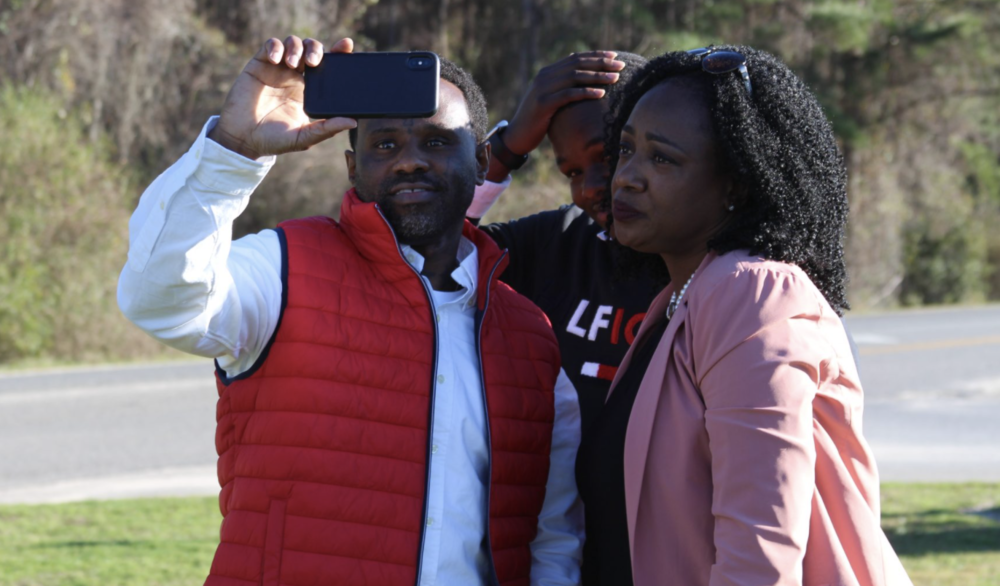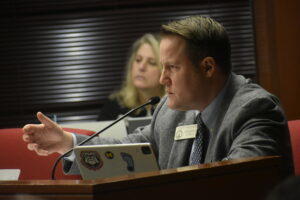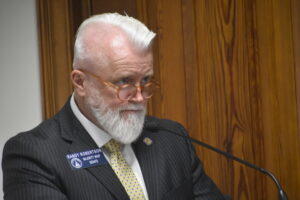
Caption
Kerry Robinson is one Georgian currently receiving restitution for a wrongful conviction through an ad hoc legislative process that critics have long described as inefficient and inconsistent.
Credit: Georgia Innocence Project

Kerry Robinson is one Georgian currently receiving restitution for a wrongful conviction through an ad hoc legislative process that critics have long described as inefficient and inconsistent.
The harsh reality for many wrongly convicted Georgians is that after spending decades locked away by the state, they are released without a financial safety net of any kind. So, getting absolved of guilt provides only a bit of solace.
Thirty-five states, the federal government, and Washington, D.C., maintain laws establishing a fair and efficient compensation process for people who were wrongfully convicted of crimes and sent to prison.
About 4% of all death penalties in the country were imposed on innocent people from 1973 to 2004. Georgia has exonerated 48 people since 1989, according to the National Registry of Exoneration Cases.
“That’s a total of 563 years lost,” said Blis Savidge, the communications manager at the Georgia Innocence Project. “But our state continues to correct many wrongful convictions each year.”
Correcting wrongful convictions is only the first step in acknowledging the miscarriage of justice done to these men and women. But, despite bipartisan legislative efforts, Georgia is far behind other states on creating a compensation system that works in a systematic way.
"So one big problem with the current process, it’s really inefficient and complex and unreliable,” Savidge said. “What (lawmakers) have to do is find somebody to sponsor their private resolution, and go through all of the steps that you would have to go through in order to pass a bill into a law – just for an individual’s compensation.”
One bill that aimed to streamline the compensation process for exonerees has been circulating under the Gold Dome for a few years now, but even after this year’s General Assembly, lawmakers still struggled to form a consensus on compensation reform.
House Bill 364 is bipartisan legislation that would create an expert panel consisting of a judge, district attorney, a defense lawyer, one member from the House and one from the Senate.
The author of the bill, Atlanta Democratic Rep. Scott Holcomb pitched his bill as a fix to a system that puts many state lawmakers in an uncomfortable position when having to decide on an amount to award exonerees.

Rep. Scott Holcomb.
“Many members have shared with me, candidly, that they feel a little bit uncomfortable making these decisions that require an expertise and understanding, if the person was in fact innocent, of reviewing the legal case history to come up with a good decision,” Holcomb said.
Not only does the proposed legislation make the compensation process easier, but it also gives exonerees a fair hand when determining how much money, if any, will be awarded, Holcomb said.
But many supporters of HB 364, including Holcomb, were blindsided when the bill died in the Senate this year, despite it receiving a majority vote in the House and a unanimous vote in the Senate Appropriations committee – where Cumming Republican Sen. Greg Dolezal added amendments to increase the range of minimum monetary awards an exonerated person could receive from $50,000 to $100,000 per year of incarceration to an increased baseline of $60,000 per year of incarceration to $120,000 per year.
Complicating the outlook for the legislation’s prospects next year is that lawmakers on the fence aren’t specific about what parts of the bill they believe should be fixed.
“This bill has been around for two years now. And I have not heard any specifics as to what provision should be changed. I don’t have any feedback along those lines,” Holcomb said. “So it’s hard to take general statements when a bill has been available for two years, and then to respond without some specific issue that needs to be addressed.”
But one reason some lawmakers opposed the bill during the 2023 legislative session is a lingering question of whether people who are receiving compensation are truly innocent, or instead freed on a legal technicality. At least, that is the concern of Cataula Republican and former law enforcement officer Sen. Randy Robertson, who says he is now writing his own version of Holcomb’s bill.
“I feel, and others feel, that these types of determinations need to be made in the judicial branch, because one of the problems we have is when you ask somebody what exoneration means you get about five different definitions,” Robertson said, “But if you research exoneration, exoneration means, cleared, cleared of all guilt. And in some of the cases that have been brought forward. That was not the case.”
“And I’ve yet to see one, based on evidence, per se, that showed the individual did not do it. What we’ve normally seen are these people coming out based on technical issues, and not issues of exoneration,” Robertson said.

Sen. Randy Robertson.
Yet, HB 364 tackles that question by only allowing wrongly incarcerated people who have established actual innocence, to overturn their conviction and then qualify for compensation.
“It has to be focused on innocence and I don’t know that we will be able to get consensus for anything beyond that. I don’t think there would be much willingness from the General Assembly or from taxpayers to compensate somebody who actually committed a murder, but then was released, because of some type of legal issue,” Holcomb said.
Robertson’s argument could actually justify the need for people with legal, unbiased expertise to oversee compensation for the wrongly convicted. Once a person is declared guilty of a crime, it can be nearly impossible to erase the stigma.
But this stain on a reputation can continue to hinder the lives of people who fought the legal system and proved they were innocent beyond a reasonable doubt, which is no small feat.
“It takes years, often decades. We have clients for 10 or 11 years. So I think that is frustrating when we’re going through these legislative hearings, and trying to get compensation for our clients, and these wrongfully convicted people, because we know how long these cases have been investigated,” Savidge said. “We know how long they have been litigated. We know how scrutinized they have been by so many different levels of the court, often to the state level Supreme Court. It’s really frustrating to hear these lawmakers who only hear, you know, 10-20 minutes of the story, make such bold claims.”
“We literally litigate these for decades, these aren’t things that just go through the system and it’s like, boop, boop, boop, innocent, no. These (cases) are tough,” Savidge said.
Holcomb’s bill requires each member of the panel to have specific expertise in wrongful convictions where the person’s innocence was determined by DNA evidence. And although DNA has played a role in just 575 exonerations out of 3,300 nationally since 1989, in many cases, DNA evidence is all a defendant has to stake their claim of innocence.
Take the case of Kerry Robinson, who was convicted on charges of rape in 2002, but was released in 2020.
Only two pieces of evidence were brought up against Robinson, the testimony of co-defendant Tyrone White, whose DNA was present in the the sexual assault kit taken from the victim, and an inaccurate testimony sworn to by Brad Pearson, a laboratory analyst for the Georgia Bureau of Investigation, who falsely claimed Robinson’s DNA was a match for the remaining DNA found in the assault kit.
Forensic scientists who helped on Robinson’s case argued that there was no objectivity during the DNA analysis, since Pearson knew the defendant’s identity and the details of the case.
Greg Hampikian, a professor of biology and criminal kustice and co-director of the Idaho Innocence Project at Boise State University, spent at least 10 years helping Robinson prove his innocence, after recognizing the bias that was blatant after Pearson’s testimony was cross-examined.
“So Kerry says he’s innocent. We have this mixture. And what people were doing with mixtures at that time was kind of hocus pocus. And I was part of it. We were all part of it,” Hampikian said. “We’re all trained in the same way of looking at the peaks trying to guess who’s in and who’s out. And, because of the systemic structure of forensic science, that is, it evolved from police labs, the language is all about get the guy.”
Robinson was about two years short of completing his 20-year sentence when Hampikian partnered with Cybergenetics CEO Mark Perlin, who was rolling out a new system for testing complex DNA mixtures, called TrueAllele. The test is designed to eliminate the risk of bias in forensic analysis interpretations.
“The suspect’s DNA profile was always considered in analyzing the DNA evidence data. So the concept that it was even possible to have a computer in mathematics, look at the data without a suspect, in other words, do a completely unbiased objective analysis of the data, using nothing but the data and math. That’s it. That was not done,” Perlin said.
“What TrueAllele does is, it unmixes DNA mixtures. It does that objectively. It doesn’t look at who you’re going to compare it with, it just unmixes the data into genetic types. These genotypes can then be compared with anyone, including people of interest, like defendants or victims (by prosecutors and lawyers),” Perlin said.
As a former prosecutor, Holcomb has taken into account the complexities of these cases, not just from his own personal experience as a litigator, but from the perspective of those who suffer through decades of incarceration at the fault of the legal system.
“It’s very complicated, because the system is built off the Jim Crow system. It’s not just here in Georgia, it’s like, everywhere. And the system is very, very lazy,” Robinson said, “You know, so it’s a process and you just have to have faith in it, just find a team of lawyers and DNA experts just know, doesn’t see color, and fight, fight for what’s right in life.”
Robinson is one of a few Georgians receiving compensation. In 2022, Robinson was awarded $480,000 for his time spent in prison, and now he has a podcast detailing the story of his exoneration called The 4%.
But even three years post-release, Robinson still recognizes the toll this has had on his life, and hopes that lawmakers take the wrongfully convicted person’s livelihood into account when discussing compensation.
“It was horrible. To leave two kids, my fiancé at the time, my family. Altogether, just being incarcerated, dehumanized, you know, it was terrible. I don’t think there’s a word for it,” said Robinson.
Cases like Robinson’s speak to “the lack of uniformity in our current process” and that is why this bill is severely needed now, Savidge said.
Both Holcomb and Robertson say they are willing to work with anyone on either side of the aisle on their bills to reform Georgia’s process to compensate the wrongly convicted.
But, while Robertson said his background in law enforcement complements Holcomb’s background as a prosecutor, the Republican said his bill will take into account the experience of people who are there at the very beginning “when the shots are fired,” and would place the bulk of the fiscal responsibility on the district where the conviction occurred.
“I would love to put together a carefully thought out, crafted piece of legislation that would put this responsibility where it needs to be,” Robertson said.
“But I will not support something rushed through that we have to go back and try to fix every two years, because we did not consider a particular part of the criminal justice system to include the judiciary, the prosecutorial, the law enforcement or the victims. We have one opportunity to get this absolutely right,” he said.
In addition to improving the compensation process, Holcomb said lawmakers and law enforcement should focus on more preventative measures to reduce crime that are not just centered around locking people up.
“I do want there to be prosecution, I want there to be arrests and prosecutions for those that commit offenses, and I want them to also be treated fairly in terms of the sentencing,” Holcomb said. “But I really would like to see a lot more attention devoted to how we reduce the incidence of these crimes to begin with.”
This story comes to GPB through a reporting partnership with Georgia Recorder.